Young Woman Criticizes Her BF For Being Too Emotional About His Terminally Ill Dog And Feels The Wrath Of Reddit
Everyone has their own way of dealing with loss, but losing a loved one is always devastating. The same is true when you lose a pet.
It's common to hear people compare their pets to their children because they spend every waking hour with them. Therefore, it makes sense that losing a four-legged family member can be so upsetting and sad.
This week, we found a specific example of someone going through that but not receiving any support from their significant other at all. As if you could overreact to something like that...
This woman even had the audacity to come to Reddit and ask if she was being an a-hole when she asked her BF to stop overreacting to his dog's cancer diagnosis! Some people are unbelievable...
Naturally, Reddit retaliated. It's hardly surprising that everyone who saw this message had a strong opinion about it, given that users on that website are known for being both extremely judgmental and animal lovers (in that order).
People simply couldn't believe that this awful girlfriend thought she was in the right after treating her partner and his suffering with such disrespect. Take a look at this interesting story:
OP is a young woman in a relationship with a man who just found out that his dog is terminally ill.
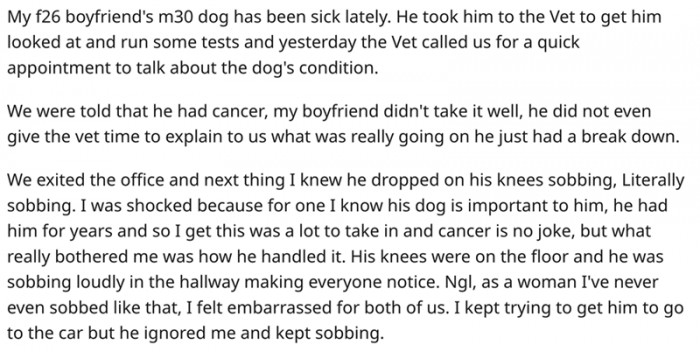
OP is a young woman in a relationship with a man who just found out that his dog is terminally ill. His reaction surprised OP, and she deemed it overreacting. She also found it embarrassing.
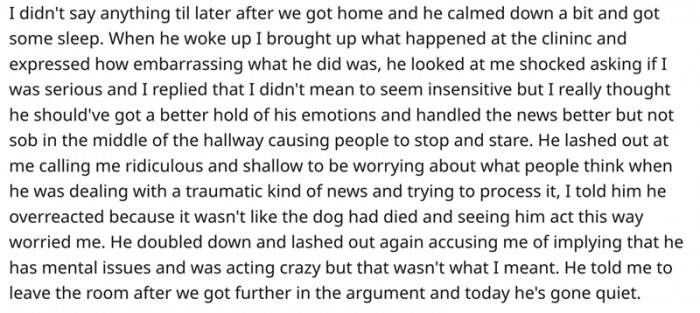
BF accused OP of being insensitive, and they had a big fight. Now OP asks if she was wrong.
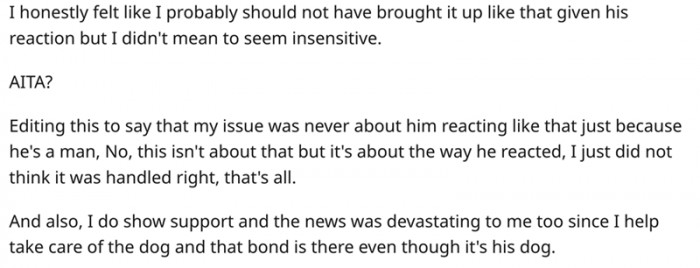
Emotional Processing and Grief
Losing a pet can trigger a profound grief response, similar to what is experienced when losing a human loved one. Research published in the Journal of Death and Dying indicates that pet loss is often underappreciated in its emotional impact, leading many individuals to feel isolated in their grief.
According to Dr. Julie Axelrod, a clinical psychologist specializing in pet loss grief, this emotional turmoil stems from the unique bond many people share with their pets, which can serve as a source of unconditional love and companionship. This relationship often creates a deep sense of loss that mirrors parental grief.
Understanding the legitimacy of one's grief is crucial for both the individual experiencing it and their significant others. Recognizing that emotional expression is a valid response to this kind of loss can foster healthier support systems during such challenging times.
For those grappling with the emotional fallout of losing a pet, it’s essential to find constructive outlets for grief. Dr. Alan Wolfelt, a renowned grief counselor, advocates for the importance of creating rituals that help commemorate and honor the lost pet. This might involve holding a memorial service or creating a scrapbook of memories.
Engaging in such activities can facilitate a sense of closure and allow individuals to express their emotions in a tangible way. Additionally, support groups—both online and in-person—can provide community and understanding, as they connect individuals experiencing similar losses.
Practicing self-compassion during this time is also crucial; allowing oneself to feel sadness without judgment can promote healing. Seeking professional help through therapy can offer a structured environment to process these complex emotions, reinforcing the idea that it's okay to grieve and to seek support.
Reddit snapped back at OP

If we are in a relationship, our partners are the first we turn to for emotional support. And if that support is lacking...

This Redditor makes a good point. This kind of situation is exactly why men have issues showing emotions. The truth is that he would receive much more understanding from men in this situation, even though they are all trying to be macho all the time.
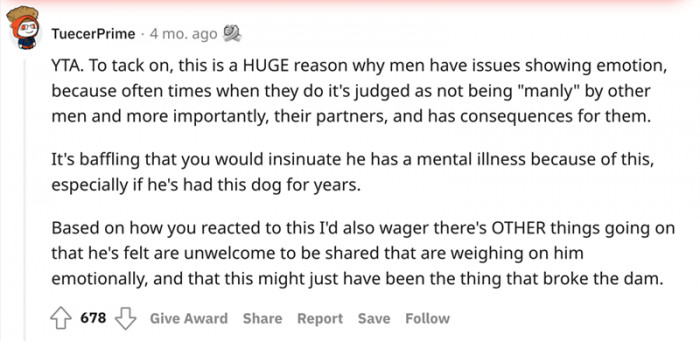
It's important to recognize that societal norms often dictate how emotions are expressed, particularly in men. According to Dr. Terri Orbuch, a relationship researcher and author, "Men are often socialized to hide their emotions, which can lead to feelings of shame when they do express grief." This social conditioning can create friction in relationships, especially when one partner feels comfortable expressing emotions while the other does not. A study from Dr. John Gottman, a renowned marriage researcher, indicates that emotional suppression can negatively impact mental health, leading to increased anxiety and depression. Encouraging open conversations about emotions in relationships can help bridge this gap. Couples can benefit from setting aside dedicated time to discuss their feelings surrounding grief and loss, fostering a space where both partners feel validated and supported.
OP probably never had a similar bond, so she can't relate.

Redditors doubt that people were staring at OP and her BF. They say that people are usually very sympathetic in these situations.
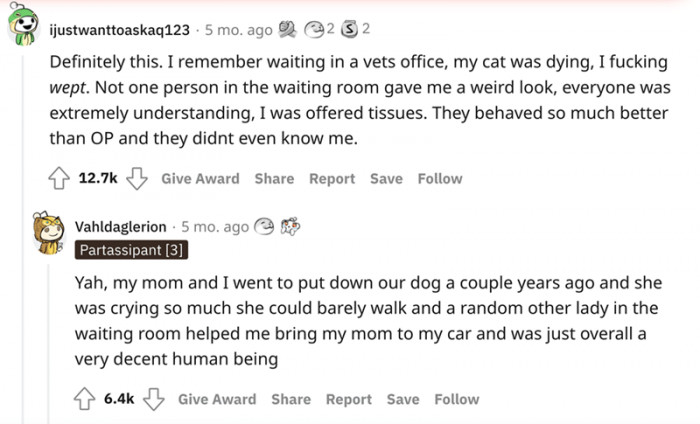
People don't have any right to tell others how they should feel and deal with trauma.
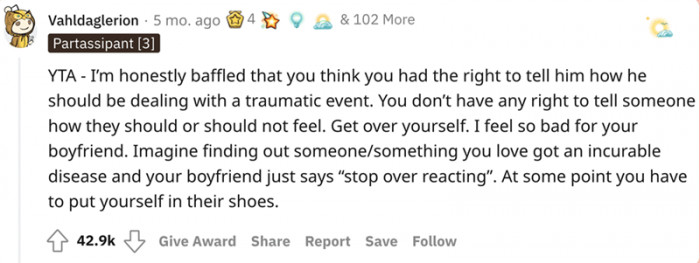
Understanding Grief Responses
Research has shown that grief is not a linear process; rather, it can manifest in various ways depending on personal experiences and coping mechanisms. According to Dr. Elizabeth Kübler-Ross, the theoretical framework she established, known as the Kübler-Ross model, outlines five stages of grief: denial, anger, bargaining, depression, and acceptance.
While many people may not experience these stages in a straightforward order or even at all, understanding this model can help individuals and their partners navigate the complexities of grief. For example, a person might feel anger over the impending loss of a pet one moment and a sense of acceptance the next, which can be confusing for both them and their loved ones.
It’s beneficial for partners to educate themselves on these emotional stages and recognize that grief may resurface at unexpected times, even long after the initial loss. This awareness can cultivate patience and understanding, allowing both individuals to support each other more effectively during their grieving processes.
The bottom line is:
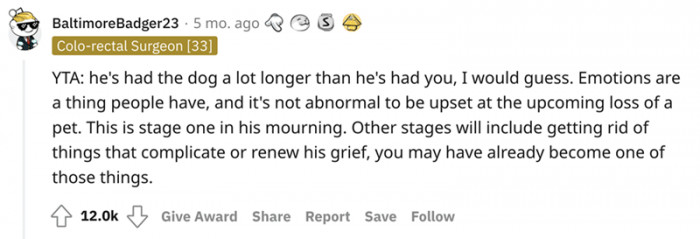
This story shows why men have such a hard time showing emotions. Women often say they want a sensitive guy who is "not afraid to cry."
But when guys show emotions, they judge them and find it unmanly. In fact, they find it embarrassing.
As the saying goes—be careful what you wish for.
Redditors were unanimous in their criticism of OP. Perhaps after reading the harsh criticisms left by other commenters on the thread, OP will start to adapt and become a better partner.
Psychological Analysis
This situation highlights how deeply personal grief can be, especially when it comes to losing a pet, which many people view as family. The girlfriend’s reaction likely stems from a lack of understanding or personal experience with that kind of bond, which can lead to insensitivity toward her boyfriend's emotional response. It's a reminder that emotional expression, especially in men, can be complicated by societal expectations, and fostering empathy in relationships is crucial for navigating such challenging moments.
Analysis generated by AI
Behavioral Analysis & Pathways Forward
In recognizing the profound impact that grief can have on individuals, especially in the loss of a beloved pet, it becomes clear that emotional expression should not be stigmatized. Research consistently shows that allowing oneself to feel and express grief is a vital part of the healing process. As psychological studies illustrate, 'understanding and validating one's grief can significantly enhance emotional well-being and relationship dynamics.'
Ultimately, fostering a culture of openness and support around grief can not only aid individuals in their healing journey but also strengthen their relationships with those who care about them.



